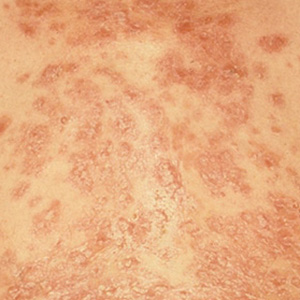Association of single-nucleotide NR3C1 gene polymorphisms with glucocorticosteroid responsiveness in patients with pemphigus vulgaris

Accepted: 12 September 2021
HTML: 7
All claims expressed in this article are solely those of the authors and do not necessarily represent those of their affiliated organizations, or those of the publisher, the editors and the reviewers. Any product that may be evaluated in this article or claim that may be made by its manufacturer is not guaranteed or endorsed by the publisher.
The glucocorticosteroid (GC) is crucial when managing patients with pemphigus vulgaris (PV). Polymorphisms in the gene encoding the nuclear receptor subfamily 3, group C, member 1 (NR3C1) protein (the GC receptor) may explain the variations in treatment efficacy. We evaluated the effects of 10 single nucleotide polymorphisms (SNPs) in the NR3C1 gene and the correlations with the GC responsiveness in patients with PV. The accumulative GC doses were recorded, and patients were assessed for the Pemphigus Disease Activity Index (PDAI) scores until the GC doses would be tapered. Whole blood samples at the initial visit were genotyped using TaqMan SNP Genotyping. In the NR3C1 gene, SNPs were detected in 6 (rs17209237, rs11745958, rs7701443, rs41423247, rs33388, and rs6196); the genotypes rs17209237 AA, rs11745958 CC, and rs6196 AG may be associated with a need for a lower accumulative GC dose; rs17209237 AA and rs6196 AG with shorter times to commencement of tapering; and rs17209237 AA and rs11745958 CC with shorter times to attainment of 50 and 25% PDAI scores. Thus, NR3C1 gene variations may predict GC responsiveness in PV patients.
Hietanen J, Salo OP. Pemphigus: an epidemiological study of patients treated in Finnish hospitals between 1969 and 1978. Acta Derm Venereol 1982;62:491-6.
Simon DG, Krutchkoff D, Kaslow RA, et al. Pemphigus in Hartford County, Connecticut, from 1972 to 1977. Arch Dermatol 1980;116:1035-7.
Kar PK. Recent trends in the management of pemphigus vulgaris. Med J Armed Forces India 1998;54:243-6.
Kridin K, Sagi SZ, Bergman R. Mortality and Cause of Death in Patients with Pemphigus. Acta Derm Venereol 2017;97:607-11.
Harman KE, Brown D, Exton LS, et al. British Association of Dermatologists’ guidelines for the management of pemphigus vulgaris 2017. Br J Dermatol 2017;177:1170-201.
Hertl M, Jedlickova H, Karpati S, et al. Pemphigus. S2 Guideline for diagnosis and treatment—guided by the European Dermatology Forum (EDF) in cooperation with the European Academy of Dermatology and Venereology (EADV). J Eur Acad Dermatol Venereol 2015;29:405-14.
Amagai M, Tanikawa A, Shimizu T, et al. Japanese guidelines for the management of pemphigus. J Dermatol 2014;41:471-86.
Ashwell JD, Lu FW, Vacchio MS. Glucocorticoids in T cell development and function*. Annu Rev Immunol 2000;18:309-45.
De Bosscher K, Vanden Berghe W, Haegeman G. Mechanisms of antiinflammatory action and of immunosuppression by glucocorticoids: negative interference of activated glucocorticoid receptor with transcription factors. J Neuroimmunol 2000;109:16-22.
Mwinyi J, Wenger C, Eloranta JJ, et al. Glucocorticoid receptor gene haplotype structure and steroid therapy outcome in IBD patients. World J Gastroenterol 2010;16:3888-96.
De Iudicibus S, Franca R, Martelossi S, et al. Molecular mechanism of glucocorticoid resistance in inflammatory bowel disease. World J Gastroenterol 2011;17:1095-108.
Dubois-Camacho K, Ottum PA, Franco-Muñoz D, et al. Glucocorticosteroid therapy in inflammatory bowel diseases: From clinical practice to molecular biology. World J Gastroenterol 2017;23:6628-38.
Mohamed NA, Abdel-Rehim AS, Farres MN, et al. Influence of glucocorticoid receptor gene NR3C1 646 C>G polymorphism on glucocorticoid resistance in asthmatics: a preliminary study. Cent Eur J Immunol 2015;40:325-30.
Panek M, Pietras T, Antczak A, et al. The N363S and I559N single nucleotide polymorphisms of the h-GR/NR3C1 gene in patients with bronchial asthma. Int J Mol Med 2012;30:142-50.
van Oosten MJ, Dolhain RJ, Koper JW, et al. Polymorphisms in the glucocorticoid receptor gene that modulate glucocorticoid sensitivity are associated with rheumatoid arthritis. Arthritis Res Ther 2010;12:R159.
Liu J, Wan Z, Song Q, et al. NR3C1 gene polymorphisms are associated with steroid resistance in patients with primary nephrotic syndrome. Pharmacogenomics 2018;19:45-60.
Fang SY, Li CL, Liu XS, et al. Correlation between polymorphisms of the NR3C1 gene and glucocorticoid effectiveness in patients with pemphigus vulgaris. Sci Rep 2017;7:11890.
Shen GQ, Abdullah KG, Wang QK. The TaqMan method for SNP genotyping. Methods Mol Biol 2009;578:293-306.
Xu Z, Taylor JA. SNPinfo: integrating GWAS and candidate gene information into functional SNP selection for genetic association studies. Nucleic Acids Res 2009;37:W600-5.
Boulard C, Duvert Lehembre S, Picard-Dahan C, et al. Calculation of cut-off values based on the Autoimmune Bullous Skin Disorder Intensity Score (ABSIS) and Pemphigus Disease Area Index (PDAI) pemphigus scoring systems for defining moderate, significant and extensive types of pemphigus. Br J Dermatol 2016;175:142-9.
Nicolaides NC, Galata Z, Kino T, et al. The human glucocorticoid receptor: molecular basis of biologic function. Steroids 2010;75:1-12.
Du H, Zhao J, Su Z, et al. Sequencing the exons of human glucocorticoid receptor (NR3C1) gene in Han Chinese with high-altitude pulmonary edema. J Physiol Anthropol 2018;37:7-.
Niu N, Manickam V, Kalari KR, et al. Human glucocorticoid receptor alpha gene (NR3C1) pharmacogenomics: gene resequencing and functional genomics. J Clinical Endocrinol Metabol 2009;94:3072-84.
PAGEPress has chosen to apply the Creative Commons Attribution NonCommercial 4.0 International License (CC BY-NC 4.0) to all manuscripts to be published.





 https://doi.org/10.4081/dr.2021.9190
https://doi.org/10.4081/dr.2021.9190



